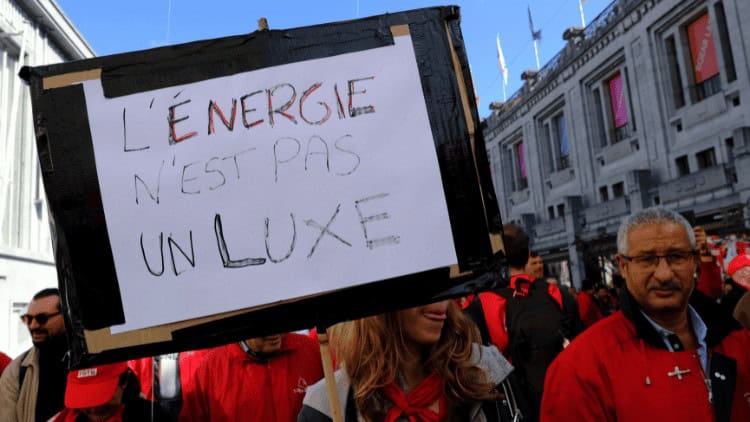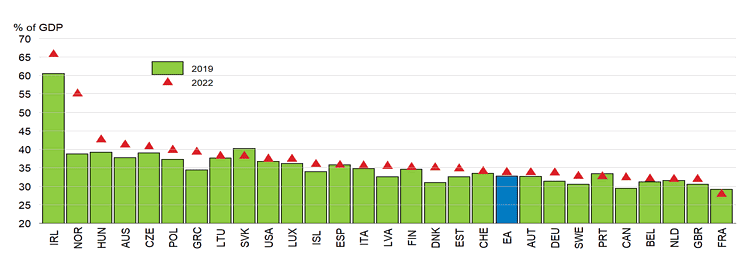It’s time to strengthen labour in the face of inflation, not to continue trying to weaken it.

‘You never want a serious crisis to go to waste.’ Many businesses have taken this famous aphorism to their hearts when confronting the events that disrupted economic activity over the past few years: reopening after the pandemic, bottlenecks in key global supply chains, soaring energy prices, the war in Ukraine, failing harvests. Corporations did not simply pass on more expensive input costs as higher sales prices—they often charged extra to boost profits.
In its latest Economic Outlook, the Organisation for Economic Co-operation and Development adds to the already overwhelming evidence that almost all OECD economies have experienced increasing profit shares in the midst of a ‘cost of living’ crisis (see graph). The fact that domestically generated inflation did not start with wages and labour markets but was driven by business hiking sales prices, to boost profits, has important implications.
The share of gross profits (gross operating surplus) in GDP increased in most countries since 2019

Room for wage growth
There is substantially more room than is recognised for non-inflationary nominal wage growth. The rule of thumb to estimate what is compatible with the central bank’s price-stability target is to add to the latter trend labour-productivity growth. Assume businesses will pass on wage-cost increases per unit of output—thereby discounting productivity growth—in sales prices. If unit wage costs increase in line with the price-stability target, there is no inflationary pressure to overshoot it.
This rule of thumb does not apply where initial profits are substantial: high profits can provide a buffer to neutralise pressure on inflation from more robust wage increases. Nominal-wage dynamics can then exceed the rule of thumb without endangering price stability.
Profit-price spirals however bring into question the narrative currently used to explain inflation. According to this story, high inflation results from excess aggregate demand—implicitly due to wage push putting upward pressure on prices—and will endure unless demand is dampened. And in the early postwar decades high-demand / high-pressure economies experienced a risinglabour share of income as the bargaining position of workers was much stronger, yet today we are observing the opposite: profit shares are rising.
A more convincing narrative is that recent supply-side disruptions and bottlenecks generated monopoly power on product markets. Knowing that competitors were facing the same problems, of soaring input costs and material shortages for key production inputs, individual firms were in a position to hike prices without having to fear losing market share as production for the entire sector was constrained. Sales prices thus ended up being raised over and above higher input costs.
Cuts in real wages
This monopoly power, and the pressure it generates on inflation, is temporary. Supply-side disruptions are now largely behind us, as is business’ extreme pricing power. Firms again need to be attentive to the risk of competitors preying on their market share and think twice before indulging in price gouging.
With businesses no longer benefiting from radical pricing power, firms will see themselves forced to reduce the additional profit margins they have come to capture. If they do not and try instead to raise prices again to meet demands for higher wages, they risk losing market shares to competitors that attenuate profit margins instead. This enhances the case for stronger wage growth.
Profit-price spirals have redistributed income from labour to business. This clearly shows in cuts in real wages while dividends paid by the world’s 1,200 largest firms rose by 8.5 per cent in 2022, to a record $1.56 trillion. The backdrop is a decades-long trend of falling labour shares, with growth in real median wages systematically lagging behind productivity trends. To restore some fairness, nominal wage growth needs to pick up, so that purchasing power lost to business can be transferred back to workers.
Disciplining workers
While the role of profits in co-driving the cost-of-living crisis is well documented, there is a failure fully to grasp the consequences for economic policy. Policy, including the OECD Economic Outlook, continues to be based on the (mis)conception that the root of inflation is to be found in tight labour markets and excess aggregate demand.
Despite the evidence on corporate profiteering, the priority thus remains to prevent wage growth from picking up in any substantial way. The basic idea, in line with decades of orthodox economic thinking, is still to steer the economy into recession, to weaken the bargaining position of trade unions and discipline workers into accepting that they have simply become poorer.
This will not go well. It will not only thrust labour markets that have just recovered from the Covid-19 shock into another crisis. Blocking workers’ efforts to recover the purchasing power lost to business will entrench the recent increase in inequality, in favour of profits, for years to come. Calling for wage restraint at a time of record profits will make policy-makers look like the guardians of inequality and the enemies of inclusion. None of this bodes well for the future of already-fragile democracies.
Stronger collective bargaining
What should policy-makers do instead? They should start by acknowledging that the recent increases in profits and profit margins open up the possibility of stronger nominal wage growth without endangering price-stability targets.
This recognition should be complemented by policy reforms that allow a redistribution from profits to wages to be set in motion. That means supporting stronger collective bargaining, so that the margins for non-inflationary wage growth which do exist can be effectively mobilised.
Furthermore, and as argued in the 2022 OECD Employment Outlook, it implies promoting social dialogue—in particular tripartite concertation. Then trade unions, employers and governments can shape a balanced sharing of the cost-of-living crisis, which restores purchasing power while remaining alert to the risk of self-sustaining inflation.
Ronald Janssen is senior economic adviser to the Trade Union Advisory Committee of the Organisation for Economic Co-operation and Development. He was formerly chief economist at the European Trade Union Confederation.

